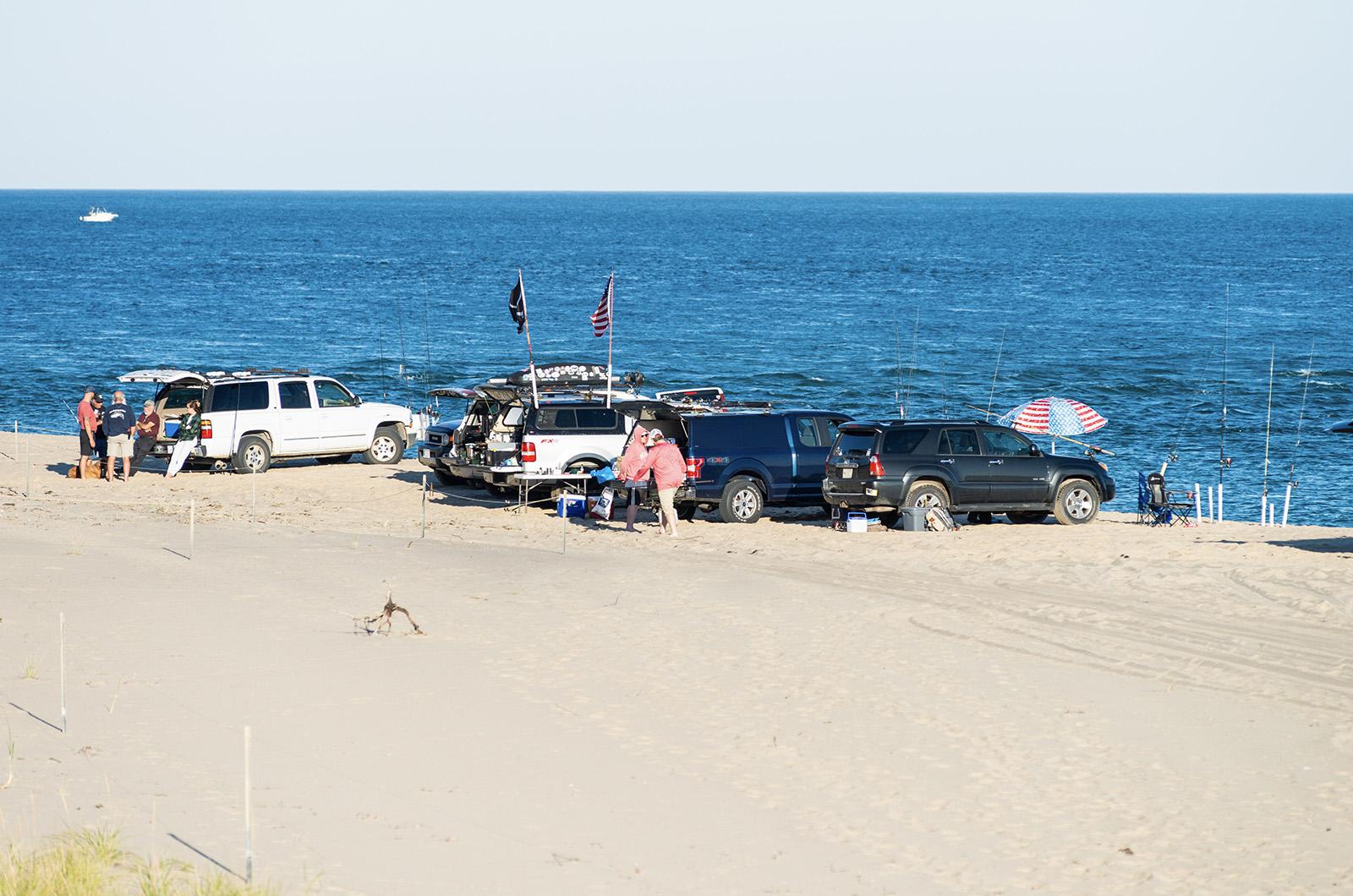After more than six months of hearings and nearly 200 comments from members of the public, the new rules for driving out on the sands of Chappaquiddick have been set.
The Edgartown conservation commission Wednesday approved new limits that cap the number of vehicles The Trustees of Reservations can allow on its 16 miles of trails on the small island. The new regulations allow no more than 200 vehicles at a time on the Trustees’ Leland and Wasque parcels, and no more than 30 on the Cape Pogue trails.
The limits have been contested by the Trustees, Chappaquiddick residents and fishermen from all angles. The Trustees originally asked for 300 vehicles across all of the properties, landowners have said those limits are too high — potentially threatening the health of the beaches — and fishermen requested historical access to be preserved.
The conservation commission’s decision of 200 vehicles could be appealed by the Trustees, or a number of other parties, but the new rules give the public an idea of what it will be like to get out to Chappy’s sandy barrier beaches with Memorial Day only a week away.
For the Martha’s Vineyard Striped Bass and Bluefish Derby, the vote came as a relief.
“It’s great to see,” said Phil Horton, chair of the derby committee and a longtime Chappy fisherman. “It represents such a big part of the available beach to the derby anglers.”
The issue has been divisive and the unanimous vote from the commission came on the 10th meeting about the management of the oversand vehicle trails popular with beachgoers.
Last week, Trustees’ CEO Katie Theoharides claimed the conservation commission limits were designed to appease Chappaquiddick homeowners who have long contended that the Trustees have mismanaged the beaches. She also raised the possibility of asking the state Department of Environmental Protection to look over the conditions to possibly issue superseding regulations.
Several conservation commission members started Wednesday’s meetings by offering rebuttals to Ms. Theoharides. Member Geoff Kontje said there’s been a lot of concerns from the public about vehicle access to the beaches, largely due to the confrontations between the Trustees and Cape Pogue landowners. He attributed the issue to high turnover within the Trustees.
“There’s been no continuity on the part of the [Trustees],” he said. “Personnel have changed over and over again and this has led to a lack of familiarity, which leads to misunderstanding, friction, misinterpretations and in the end, outright conflict.”
The Trustees are currently being sued over Cape Pogue access by Cape Pogue residents, and Mr. Kontje hoped that the tempers could simmer down to keep things running smoothly.
“Please don’t be too eager to rush this into court,” he said to the Trustees Wednesday. “And for the owners out on Cape Pogue, I’d like to say please exercise some tolerance and patience and let this run.”
Mr. Kontje also slammed Ms. Theoharides opinion piece published in the Gazette last week that lay blame on Cape Pogue homeowners who have said the new limits are too high.
“I have to say that letter was a cheap shot,” he said. “It was incorrect, inaccurate, it was inflammatory and you should be ashamed.”
In addition to the vehicle caps, the new limits from the conservation commission require monthly reports from the Trustees on vehicle counts, the number of staff and trail conditions. Vehicles are not allowed in the area known as the swimming beach except during the Martha’s Vineyard Striped Bass and Bluefish Derby and off-season, and signs are to be placed at the Chappy ferry when capacity at the Trustees properties have been reached.
Wasque will only be accessible from Norton Point.
The conservation commission also agreed to halt oversand vehicle traffic past the Cape Pogue lighthouse, cutting off vehicle access to the sandy spit at the end of Cape Pogue known as the Gut.
Mr. Kontje said the limit was based on the significant beach loss in the area of the Gut, but the commission could consider allowing future access.
“The applicant would need to file a [notice of intent] and it would be absolutely necessary that a professional survey be done with current conditions from Cape Pogue to the Gut,” he said. “The current application relied on outdated aerials and did not include an actual survey, making assessing these conditions impossible.”
Trustees Islands portfolio director Darci Schofield thanked the commission for bringing the long process to the end and said it was unfortunate that the issue had become so contentious, considering everyone largely had the same goal of enjoying and protecting the exceptional island.
“I hope in the future that we can all do better and we can all strive to do better, to work together to make this goal happen for our community, for these places that we all love,” she said.
Trustees attorney Dylan Sanders echoed Ms. Schofield, saying the concerns from the commission have been heard, even though the organization may not necessarily agree with them.
“We take them to heart and we will continue to work on the issues that you identified,” he said.
The conservation commission also allowed the current rules for the Trustees to continue in case there is an appeal, a critical measure for some beachgoers who worried access would be cut off if an appeal came about.
Trustees spokesperson Mary Detloff Thursday said the Trustees will complete a thorough analysis of the conditions from the conservation commission but she declined to comment until that process is completed.









Comments (28)
Comments
Comment policy »